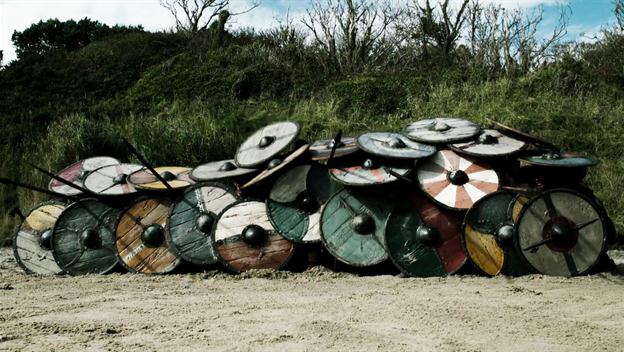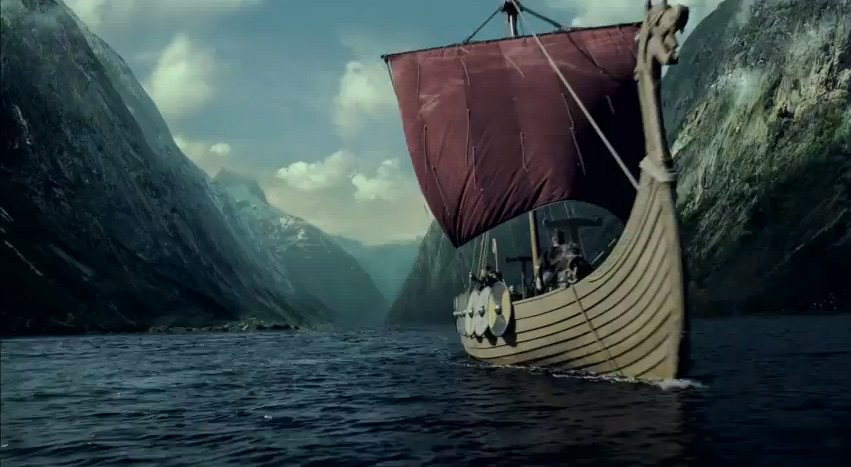Vikings is a dramatic series, as opposed to the channel's generally poor history documentaries, which often are neither factual nor interesting, or so have complained many people who watch the channel. But in 2012 the History Channel experimented with Hatfields and McCoys, its first dramatic miniseries. It did well in the ratings -- I liked it too (though the West Virginia and Kentucky counties were remarkably free of any nonwhite residents).
In a discussion Elsewhere, Vikings watchers who think this television series is one of the best things going at the moment, have asked, "How did the History Channel manage do this right?"
They did it right because the History Channel essentially didn't do it. MGM and Michael Hirst did it, both experienced and professional at creating period spectacle. Hirst (The Tudors is among his previous credits) produces and writes much of Vikings
The show is a class production in every aspect, from the opening credits (visuals, lyrics and the musical composition) to cast, script, locations and set dressing. It's gorgeous and majestic as the mountains and fjords, as indifferent as the sea and sky, warm and intimate as fire and wool, as real as friends and sword.
Hirst based the characters and the story arcs loosely on the saga of Ragnar Lodbrok -- From wiki:
It follows the exploits of the legendary Viking chieftain Ragnar Lodbrok and his crew and family, as notably laid down in the 13th century sagas Ragnars saga Loðbrókar and Ragnarssona þáttr, as well as in Saxo Grammaticus's 12th century work Gesta Danorum. Norse legendary sagas were partially fictional tales based in Norse oral tradition, written down about 200 to 400 years after the events they describe. Further inspiration is taken from historical sources of the period, such as records of the Viking raid on Lindisfarne depicted in the second episode, or Ahmad ibn Fadlan's 10th-century account of the Volga Vikings. The series is set at the beginning of the Viking Age, marked by the Lindisfarne raid in 793.I re-watched the first season on dvd, prior to the new season's first episode broadcast. While last year I enjoyed the first season, this re-watch, without commercial interruptions, two - three episodes at a time, revealed the production to be even better than I'd initially thought.
A re-watch underlines Vikings's strong contrast to the HBO Got series. It's particularly different in the attitude with which an historic people's violence is depicted, and the attitude of fantasy writers toward the violence attributed to fantasy cultures -- a fantasy that yet is declared to reflect the realism of a medieval time. The violence in Got is purely for entertainment -- or perhaps, secondarily, it is there to be shoved into the audience's face -- take that! -- so the writers of Got can snicker at how much that can shove in a gullible face. Mostly gratuitous, unrooted in real world consequences, Got's violence is nearly always coupled with sexual violation-humiliation in some way (see Brienne, Maid of Tarth, gnerally, for instance, and Brienne particularly with the bear). Got wallows, when it comes to Theon Greyjoy, in snickering, sickly, creepy gratuitous torture -- entwined with sexual snickering, sickly, creepy, immature emotional sickness. I recently clocked those scenes of Greyjoy's season 3 torture -- they are the longest scenes in the episodes. Instead of story line, plot development or character, the producer-writers prefer prolonged, close-up of some hunan beings rejoicing in doing the worst things they can think of to another human being's body -- for our and their entertainment. I also kept count in one season 3 episode of the number of times the word "rape" was used -- it was the favorite noun in that episode. In the world of Got there's no joy of any kind.
 |
| For lovers of the shield wall, we see it, often; it's even more terrifying than Bernard Cornwell's Uhtred's description in the Saxon Chronicals |
There is a whole cast of fascinating characters, among whom is the protagonist and Lagertha's husband, Ragnar -- as dark as he can be, and even as shyte-eating as he is at one point in season 2 opening episode. In other words, he's an authentic human hero, who lives bigger than life, yet is not one of the gods to whose allegiance he is sworn -- and with whom he will bargain.
One may wonder about some things: did men use cosmetics for ornamentation as much as for ceremonial purpose or cutting sun glare? Those hair styles -- are they authentic? Were couples in this time and place open about inviting a third into their marital embrace? Most of all: were these sea-faring people so ignorant at the close of the 8th century of knowledge that there were lands in the west?
Nevertheless, Vikings convinces the audience that these people took great joy in living, in their friends and family, good food, songs and stories, that they enjoyed their curiosity about other lands and gods, and they loved beauty for its own sake. t It gets us to believe in their battle joy too, rooted as it is in their belief system which never forgets that death is always on its way.
So, for those of us who love historical fiction, Vikings is the best thing on television this spring.



No comments:
Post a Comment